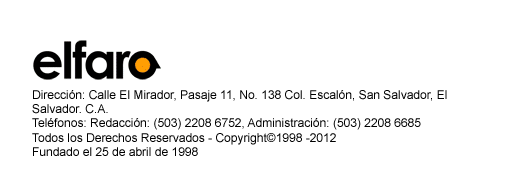EL SALVADOR: SIX MONTHS FROM ELECTIONS, ARENA CLIMBS/FMLN SELF-DESTRUCTS
Publicado el 8 de Septiembre de 2011
id: 40260
date: 9/9/2005 15:31
refid: 05SANSALVADOR2507
origin: Embassy San Salvador
classification: CONFIDENTIAL
destination:
header: This record is a partial extract of the original cable. The full text of the original cable is not available.
----------------- header ends ----------------
C O N F I D E N T I A L SECTION 01 OF 03 SAN SALVADOR 002507
SIPDIS
E.O. 12958: DECL: 09/08/2015
TAGS: ES, PGOV, PREL, ELECTIONS 2006
SUBJECT: EL SALVADOR: SIX MONTHS FROM ELECTIONS, ARENA
CLIMBS/FMLN SELF-DESTRUCTS
Classified By: Charge d'Affaires Michael A. Butler, Reason 1.4 (b, d)
1. (C) SUMMARY: Six months away from March 12, 2006 municipal and Legislative Assembly elections and fifteen months into his five-year term, President Saca continues to enjoy high approval ratings unprecedented in El Salvador's postwar history. Recent polls rate Saca highest in infrastructure-building, education, and healthcare, while manifesting concern about the nation's pressing crime problems and little satisfaction with sluggish economic growth. The high level of public confidence in the administration bodes ill for the Farabundo Marti National Liberation Front (FMLN) opposition, mired in disarray and obsolete 1970s-era revolutionary rhetoric. Three more FMLN Legislative Assembly deputies defected this week to the recently-formed Revolutionary Democratic Front (FDR), reducing to 24 an FMLN delegation that only a year ago numbered 31, and could thereby block votes requiring a two-thirds majority of the Assembly's 84 seats. Most political pundits expect that on Saca's coattails, ARENA will gain at least five additional deputies and make substantial gains in mayoralties next March. The National Conciliation Party (PCN) will likely make modest gains at the expense of the FMLN fissures. ARENA appears to have a good shot at winning the San Salvador mayoralty for the first time in nearly a decade. The continuing close bilateral relationship promises to bolster Saca and his party's advantage further, as the nation looks ahead to the March contest. END SUMMARY.
2. (SBU) ARENA presently holds 29 of the Legislative Assembly's 84 seats; with the usually-dependable support of its center-right National Conciliation Party (PCN) allies' 14 deputies, legislation requiring a 43-vote simple majority is more or less a matter of routine business. Seven former FMLN deputies of the new FDR have aligned themselves with five Democratic Center (CD) deputies and three Christian Popular Social Party (PPSC; a Christian Democratic Party/PDC breakaway group), to form a loose center-left coalition of 15 seats with which ARENA and PCN must negotiate legislation requiring a two-thirds 56-vote supermajority, such as the assumption of external debt necessitated by approval of the federal budget. ARENA and the PCN now hold, respectively, 109 and 53 of the nation's 262 municipalities, including seven larger cities. The FMLN's 71 municipalities include Santa Ana and all of greater San Salvador except for one ARENA-ruled upscale suburb.
POLLS SHOW ARENA IN DRIVER'S SEAT
---------------------------------
3. (SBU) A poll performed August 20-27 by leading daily La Prensa Grafica involved 1,500 interviews nationwide with persons above the age of 18. Saca's 72 percent overall approval rating is scarcely lower than the 74 percent approval recorded at the end of the first trimester of his administration. Some 71.4 percent of those polled characterized the administration's record on education as "Very Good" or Good", while 68.6 percent qualified as "Very Good" or "Good" Saca's accomplishments in the area of public health. Respondents expressed least approval of the government's achievements in improving El Salvador's economy, which registered disappointing growth of two percent or less in recent years.
4. (SBU) A CID-Gallup poll publicized September 7-8 yielded a 71-percent level of approval for Saca, with 57 percent characterizing the President as "rather" or "very" sincere and truthful. Saca's popularity appears rooted in his attention to improving the nation's infrastructure, his "Very Firm Hand" anti-gang initiative, and the FOSALUD program whereby public health clinics are funded via increased taxes on tobacco, alcohol, and firearms. Some 31 percent of respondents indicated an intention to vote ARENA, with the FMLN mustering only 16 percent in intention to vote; some 48 percent responded that they either did not intend to vote, or had not yet decided which party they favored. Some 60 percent of respondents stated they intended to vote in March.
FOR ARENA, HANDAL IS "THE GIFT THAT KEEPS ON GIVING" -- FDR MAY BE ALSO
---------------------------------
-------------------------------------
5. (C) The FMLM's latest troubles began September 2 with the public resignation from the FMLN of moderate San Salvador Mayor Carlos Rivas Zamora--long a thorn in the side of the orthodox FMLN faction aligned with former Communist Party leader and failed presidential candidate Schafik Handal. The resignations of Legislative Assembly FMLN Whip Celina Monterrosa and deputies Hector Cordova and Arnoldo Bernal followed on September 6; all three immediately joined the FDR. The latest exodus raises to seven the number of deputies the FMLN has lost during the past year. The defectors were soon to be joined by additional moderate FMLN mayors, Rene Canjura of Nejapa and Carlos Menendez of Mejicanos. Among the ranks of high-profile FMLN moderates from just one year ago, only Santa Tecla Mayor Oscar Ortiz and Deputy Hugo Martinez remain, and Ortiz is expected to defect to the FDR as well. The key effect of these FMLN defections to the FDR is that the left will run at least two leftist candidates in many mayoral races, including San Salvador, diluting the leftist vote and paving the way for ARENA and PCN candidates.
6. (C) The response of the Handal hardliners to the defections was characteristically intransigent; FMLN national coordinator Medardo Gonzalez characterized the latest defections as "irrelevant." Departed FMLN Assembly Whip Celina Monterrosa viewed Gonzalez's comments as evidence of the party's leadership being out of touch with political reality. Furthermore, despite unsubstantiated rumors that Venezuelan President Hugo Chavez is funneling funds to the FMLN, all indications are that the party has little money at this time to mount a robust national campaign, and clearly cannot match ARENA's resources, or even those of the PCN in large municipalities. For its part, the FDR leadership has indicated that they intend to run full slates in all the major cities and many municipalities, as well as a full congressional slate. Despite its bravado, the FDR is only beginning to build a national party structure, lacks financing, and is competing head-to-head with the FMLN for political space on the left. Because of these impediments, many political observers predict that the FDR will be lucky to keep two of the present seven National Assembly seats it holds. Observers further state that the FDR will largely play the role of spoiler to the FMLN in important mayoral races such as San Salvador, and will tilt the balance in these races to ARENA or the PCN.
BILATERAL WARMTH BOLSTERS GOVERNMENT
------------------------------------
7. (C) The close U.S.-El Salvador bilateral relationship tends to further strengthen ARENA's hand in next spring's elections. Newspapers have frequently publicized USAID-funded projects in housing construction for 2001 earthquake victims, potable water supplies for poor rural communities, new clinics and schools, agricultural and rural-sector development finance through USDA, and other much-needed social investment, and U.S. assistance is widely perceived to be a benefit of postwar ARENA governments' close relationships with the U.S. Indeed, fears of a possible deterioration in that relationship likely played a significant role in the 2004 presidential election, after an ARENA campaign that highlighted the party's longtime friendship with the U.S.
8. (C) Recent U.S. ratification of CAFTA, which should go into effect January 1, was a boon to the GOES, which has raised expectations that CAFTA can help to jump-start the nation's sluggish economy. The Embassy is following CAFTA implementation closely, and USG-commited Trade Capacity Building (TCB) funds will help facilitate a smoother transition to a CAFTA environment, and in so doing, further enhance the GOES's standing. Commerce Secretary Gutierrez's upcoming visit in October presents an important opportunity to showcase how CAFTA, and the trade benefits and institutional strengthening it brings, can help address the country's widespread poverty and--by extension--its other pressing social problems. In the wake of July 15 meetings between President Bush and President Saca, the GOES is motivated to compete for Millennium Challenge Account (MCA) funding, with which the GOES plans to facilitate economic growth among the nation's heretofore-isolated northern municipalities. Signing a compact with the MCC would also help legitimize ARENA's economic program by showing it carries concrete benefits. All of these projects and the close personal relationship between Presidents Saca and Bush provide the U.S. with multiple opportunities to continue to showcase the benefits of the relationship, and to contrast El Salvador's democratic parties with the FMLN's radicalism.
9. (C) COMMENT: Notwithstanding the traditional handicap that midterm elections usually represent for any ruling party, ARENA would appear to be poised to gain both municipalities and Legislative Assembly seats next March, all on Saca's coattails. The electorate's understandable frustration with lack of significant progress on crime and the economy is more than offset by the low esteem in which they hold the strife-riven FMLN. The FMLN's latest defectors not only further erode its relevance to the legislative process, but in their joining the new FDR and fashioning possible coalition candidacies, they dilute the left's strength in even traditional FMLN strongholds such as San Salvador, Chalatenango, and Morazan. If it cannot find a way to stem the continuing hemorrhage of its best political talent, the FMLN may awaken March 13 to find an ARENA-ruled San Salvador, after the ruling party's near-decade absence from city hall, as well as key defeats in other departmental capitals and a significant loss of deputies.
10. (C) At this point, ARENA has by far the best national political organization, the deepest pockets thanks to the private sector, and a national leader in Saca who pulls major votes. Washington and Post need to continue to work closely with Saca on a successful bilateral agenda that includes ameliorating the negative effects of criminal deportees, making CAFTA a vehicle for economic growth and poverty reduction, and promoting U.S. direct private investment. Saca and his ARENA team are impressive political operatives who know how to use the power and resources of the presidency to run an effective national campaign on their own.
Butler
=======================CABLE ENDS============================




